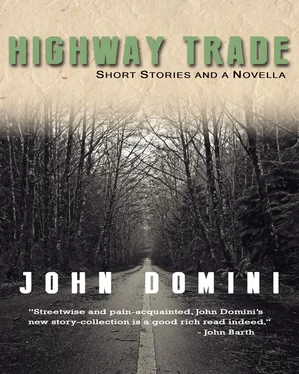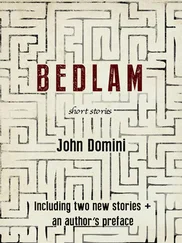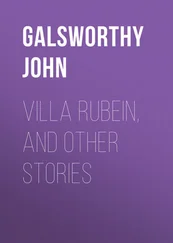John Domini - Highway Trade and Other Stories
Здесь есть возможность читать онлайн «John Domini - Highway Trade and Other Stories» весь текст электронной книги совершенно бесплатно (целиком полную версию без сокращений). В некоторых случаях можно слушать аудио, скачать через торрент в формате fb2 и присутствует краткое содержание. Год выпуска: 2013, Издательство: Dzanc Books, Жанр: Современная проза, на английском языке. Описание произведения, (предисловие) а так же отзывы посетителей доступны на портале библиотеки ЛибКат.
- Название:Highway Trade and Other Stories
- Автор:
- Издательство:Dzanc Books
- Жанр:
- Год:2013
- ISBN:нет данных
- Рейтинг книги:4 / 5. Голосов: 1
-
Избранное:Добавить в избранное
- Отзывы:
-
Ваша оценка:
- 80
- 1
- 2
- 3
- 4
- 5
Highway Trade and Other Stories: краткое содержание, описание и аннотация
Предлагаем к чтению аннотацию, описание, краткое содержание или предисловие (зависит от того, что написал сам автор книги «Highway Trade and Other Stories»). Если вы не нашли необходимую информацию о книге — напишите в комментариях, мы постараемся отыскать её.
Highway Trade and Other Stories — читать онлайн бесплатно полную книгу (весь текст) целиком
Ниже представлен текст книги, разбитый по страницам. Система сохранения места последней прочитанной страницы, позволяет с удобством читать онлайн бесплатно книгу «Highway Trade and Other Stories», без необходимости каждый раз заново искать на чём Вы остановились. Поставьте закладку, и сможете в любой момент перейти на страницу, на которой закончили чтение.
Интервал:
Закладка:
“I can see her, Robb. As plain as if she’s here.”
According to Robin’s mother — she preferred to be called Roy — the breakup was a done thing as soon as they’d moved West. Back in Philadelphia she and Dale could kid themselves that the trouble was money. Dale had fallen just short of promotion, her mother’s people just short of the contract that would make the agency. The scholarship that had carried Robin through sophomore year at the Park School had lost its funding. Meantime out in Tangent, Oregon, a former nobody in Dale’s office was doing seven thousand a month designing solar homes. Her father hadn’t stopped talking the whole way West. Robin honey, try to understand, people like Dale and Roy aren’t that old. People like Dale and Roy still have dreams. Then that same September, her mother had heaved the coffee pot through the glass panels in the alcove.
Tangent is right , her mother had screamed.
“I just wish your mother could meet Sharonna or Flo,” Dale said now. “One of the younger women I’m seeing.”
They were sidling through brambles and hip-high stands of fern. “It would be good for Roy, I think.”
Right, Dad. Good for Roy. Dale might as well have been pointing at the sky with one hand and reaching for her purse with the other. Nothing about the divorce got to Robin like that, like she had to cover up and get tricky. Of course there’d been hard places for her. Eating alone had been the worst, jar after jar of Paul Newman Spaghetti Sauce while Roy was on job interviews up in Portland. But she’d talked it all out with Anu, the whole soap opera of the last year and a half, and she’d only started crying once. These days, when she visited Tangent she was happy about it, happy for the change. In the mornings the louvers in her father’s skylight lit up in stripes.
What was the problem with the adults? God, the way Roy had carried on when she’d learned about Dale’s buried money (Robin’s mother had some outlaw contacts of her own, through a coffee shop in downtown Salem). Thousands of dollars! Roy had screamed. Thousands! Enough to move back to Philly! Robin had taken in the tantrum with hands on hips, concentrating. Likewise last night, when her father had invited her to come see his hole, Robin had nodded, avid, squinting. In both cases, it wasn’t just the money that had her hooked.
She could use the money. She’d be eighteen in July, and she and Anu had plans. But more than that, she had to learn this stuff. She had to learn what made these two poor diseased creatures tick. Robin liked to read murder mysteries, the more hard-boiled the better, and in them she always looked forward to the scene in the morgue. She always enjoyed the conversation with the coroner, a doctor with an attitude, a death-pro making wisecracks over the victim. These days, Robin figured, she had to be the coroner. She had to get smart and icy, with the dead marriage on the table before her.
Last night, Dale had kept warning her that the trek to his hole wouldn’t be easy. He’d said he would leave behind his.45, but there might be other trouble. Robin at last had fallen back on an old family line, something Dale had picked up from a movie: I don’t mind a reasonable amount of trouble. And the fact was, she wanted trouble. Not that she’d told Dale, oh no. If she’d learned one thing about keeping control, it was to let him do the talking.
Since they’d left the trail, he’d been taking her in spirals. Robin couldn’t be sure if, overall, they were moving uphill or down. Occasionally there’d be breaks in the forest, but the view left her confused. So early in the year, these woods offered a dishrag beauty, rumpled green and grease. The wrinkles of clear-cut and growth kept shifting, dreamy under the rain. The only clarity in the landscape was either a thousand feet down or a thousand feet up. Above, the sunshine now and again opened a wound in the clouds’ beard, exposing red and blue bloodlines in the puffy upper reaches of the cumuli. Below, one time, they saw the fringes of a town.
A town? A mock-up, more like it — the sort of thing her mother did for the Bureau of Tourism. A sprinkling of geometry in the lowlands. Robin tried to pick out a landmark while Dale turned away and squatted. She heard him searching through the small leaves.
“Yep,” he said. “Yep. Come and take a look.”
His old suit stank, a human mulch. Bent beside him, Robin saw the broken ivy and pine cones, the gravel trod into the ground. Yep. It looked like more than one person, too. Half-legible boot prints lay in a V of aboveground roots.
“It’s got to be the sheriff,” her father said.
Oh right. It couldn’t be anybody except the sheriff. But while he and Robin fell into step again, corkscrewing away from the overlook, Dale kept insisting that the tracks were the worst kind of trouble. The troopers, Robb.
His proof seemed to be based on the cycle of the seasons. “In the woods,” Dale said, “you don’t measure time by the weather, the way you would back East.” He took her into thicker brush, ropy salmonberry. “Here it’s just, some days are a little colder and wetter, some are a little warmer and dryer.” And so, he explained, a grower measures his year by people and their movements. “Like September first, Robb. That’s a key date, that’s when hunting season starts.”
Or had he said October first? What kind of trash was he talking? “Robin, I’ll tell you. You don’t want to be in here when there’s men walking round carrying guns.”
Then: “See, Robb. See there!”
Dale dropped into a squat, his cigarette-arm stiff behind him. “See the cuts?”
Her itching flared up again. Her father gestured across cuts in the greenery, broken branches, plainly the work of a machete. Whoever had done it, Robin couldn’t blame them. The way was blocked by a holly tree, a thorny red-speckled miracle. The exposed pulp had already gone dark and sapless, and underfoot the runoff had reduced the prints to a jumble.
“Doesn’t look too recent,” she said.
“You wish.”
She worked her hands under her sleeves, her fingernails cold against the rubbery veins.
“Listen, little girl.” Dale was picking through the grass beneath the holly. “In the woods it’s easy to see what you want to see. It’s like the ’Nam that way.”
“Give me a break, Dale. You were at Penn State the whole time.”
No response. He fingered something off the ground. “Yep, yep,” he said finally. “It’s the troopers.”
Facing her, he held it up: a black chip about the size of his palm. At first she thought that whoever had come through here had lost a piece of their machete.
“Candy bar,” Dale said.
It had to be the cigarette that made him look so fierce. Certainly his find was nothing to get worked up about. Nothing but the little dark cardboard sheet from under a Mars Bar or a Three Musketeers.
“Come on,” she said.
His face lengthened. “Okay, okay. I know what you’re thinking.”
Robin scratched more seriously.
“You’re thinking the old man’s a little paranoid. Right? You’re thinking the old man’s seen too many movies.”
“Well I mean Dale, even if these were the cops—“
“if these were the cops? If? Robin, weren’t you listening when I told you about the seasons? The point is, at this time of year nobody else should be around.”
Oh Dale. So lost in space that he didn’t see it — what could the sheriff do to them? What, even if these were the cops? Dale didn’t have his plants in yet . Nobody had their plants in yet, it was only February for God’s sake, and Robin would never have come out here with him if she’d thought she could go to jail for carrying seeds. As of now, Dale and Robin were just a couple of hikers with an idea.
Читать дальшеИнтервал:
Закладка:
Похожие книги на «Highway Trade and Other Stories»
Представляем Вашему вниманию похожие книги на «Highway Trade and Other Stories» списком для выбора. Мы отобрали схожую по названию и смыслу литературу в надежде предоставить читателям больше вариантов отыскать новые, интересные, ещё непрочитанные произведения.
Обсуждение, отзывы о книге «Highway Trade and Other Stories» и просто собственные мнения читателей. Оставьте ваши комментарии, напишите, что Вы думаете о произведении, его смысле или главных героях. Укажите что конкретно понравилось, а что нет, и почему Вы так считаете.











